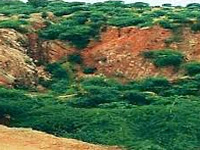
New mining rules trigger outrage
Experts, greens criticise dilution of ecological norms for quarries The revised mining rules issued by the Industries Department last week have triggered widespread concern among the public and drawn

Experts, greens criticise dilution of ecological norms for quarries The revised mining rules issued by the Industries Department last week have triggered widespread concern among the public and drawn
Institutionalised mechanism forbenefit sharing mooted As India gets ready to ratify the Nagoya Protocol on Access and Benefit Sharing (ABS) arising from utilisation of genetic resources, scientists and Intellectual Property Rights (IPR) experts point to the dangers of opening up the country’s rich biodiversity for exploitation by foreign powers without a domestic regulatory framework in place. The first meeting of the signatories to the protocol is being held in connection with the 11{+t}{+h}Conference of Parties to the Convention on Biological Diversity which began in Hyderabad on Monday.
Report of Madhav Gadgil-headed Western Ghats Ecology Expert Panel The report of the Western Ghats Ecology Expert Panel (WGEEP) headed by Madhav Gadgil has generated much heat and dust in Kerala, with environmental activists and pro-development experts adopting diametrically opposing views. But meaningful debate on the issue has been hampered by the difficulty in comprehending the voluminous report and the lack of data analysis and interpretation. The Kerala State Biodiversity Board (KSBB) has taken the initiative to address this lacuna by bringing out a handy document on the aspects of the WGEEP report relevant to the State.
Not to allow field trials of transgenic rice varieties The government on Monday asserted that it would not permit field trials of genetically modified (GM) crops in Kerala, even as research and advocacy groups came out against the Genetic Engineering Approval Committee (GEAC) for considering an application submitted by a multinational company for trial cultivation of transgenic rice.
It is now confined to 53 patches in Kerala Nestled in the deep valleys of the Western Ghats that is home to a rich diversity of flora and fauna are the vestiges of a pristine habitat that could yield precious information about evolutionary biology and climate change. Scientists from the Centre for Earth Science Studies here and the Agharkar Research Institute (ARI) in Pune are studying the Myristica swamps, a vanishing ecosystem, now largely confined to 53 patches in the Kulathupuzha and Anchal forest ranges and the Shendurney wildlife sanctuary in Kerala.
The Lakshadweep group of islands, one of the most biologically diverse and fragile environments in India, is under pressure from population, urbanisation, development of tourism, unregulated construction, pollution, and land use changes. A study on the state of the environment of the union territory, conducted by the Kerala State Council for Science, Technology and Environment (KSCSTE), has found that rising sea level and climate change are as much of a threat as human activities to the archipelago comprising corals, lagoons, sea grass, beaches, and sand dunes.
A team of scientists from the University of Kerala; Central University, Kasaragod; and Natural History Museum, London, have reported the discovery of a new species of caecilian (limbless) amphibian from the southern region of the Western Ghats in Kerala. Gegeneophis primus belongs to the Indotyphlidae family comprising African, Seychellean and Indian varieties. It is the first new species of Gegeneophis reported from Kerala since1964.
Peat deposits unearthed from coastal wetlands in South Kerala are emerging as a powerful tool for scientists to track climate history and geological evolution back over thousands of years. Scientific analysis of the fossil woods found in the sub surface deposits has traced their existence to the Holocene period, 6,000 to 10,000 years back in time.
Having a kitchen in the house is a priority for an overwhelming majority of Malayalis, but safe drinking water remains a dream for more than 70 per cent of the households in the State while 3.8 per cent still defecate in the open. The latest Census figures reveal that Kerala pales in comparison with most other States in access to piped drinking water. Only 29.3 per cent of the houses in the State are serviced by the water supply network and just 23.4 per cent get treated water.
Talking to The Hindu on her arrival here to attend a Climate Conclave organised by the British Council, Association of British Scholars and TKM Institute of Management, she outlined the challenges posed by climate change and socio-economic factors to the conservation efforts worldwide. Balancing development needs with conservation holds the key to survival of species, she asserts. She said climate change was likely to trigger droughts and flooding of low lying areas, leading to population migration between and within countries.
Urbanisation, influx of pilgrims, fertilizer-intensive farming, and indiscriminate sand-mining have impacted on the water quality of Manimala river, a major source of drinking water in Kottayam and Pathanamthitta districts. A report published in Environmental Monitoring and Assessment, an international journal devoted to progress in the use of monitoring data in assessing environmental risks to man and environment, highlights the deterioration in water quality caused by human intervention, especially in the upper reaches of the Manimala river.